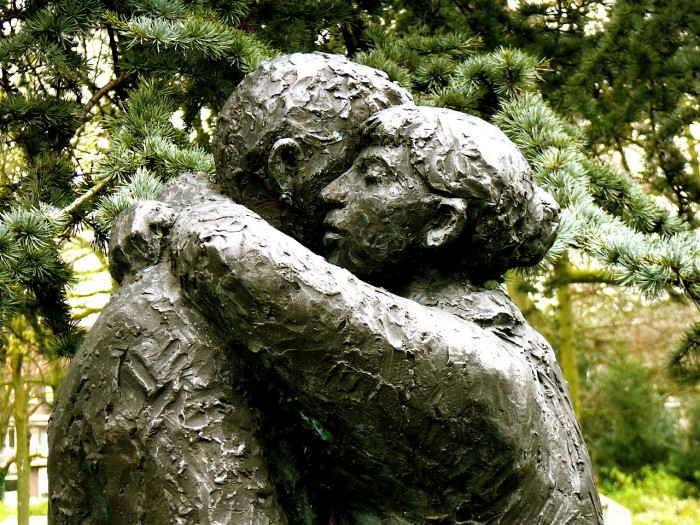Last year, I struggled to forgive someone in my life.
As I was sitting on the floor in a library in Dharamshala, a girl came over to me and handed me a book. She thought the book might interest me or help me in some way.
Sometimes, the answers we seek the most come to us at just the right time. The book turned out to be, The Heart is Noble: Changing the World from the Inside Out, by the 17th Karmapa, Ogyen Trinley Dorje.
As I flipped through the book, I glimpsed the title “Forgiving others.” It read:
“In order to forgive someone who has harmed you, it helps to reflect that the person was certainly driven by some upheaval of strong emotions. The logic we used in asking who really controls the stick can help here. People’s crazy emotions can make them act crazily, and you might even see them as suffering from a case of temporary insanity.”
At that moment, I felt I could let go of my resentment. The only thing left that had stopped me from forgiving that person was putting myself in their shoes and trying to understand the motives behind their actions. It felt so good to forgive that I raised up both of my hands, and I screamed out loud in the library, “I forgive him!”
Saying those words might be difficult at times. Even when we feel that we’re ready to forgive, our ego resists it—we think that feeling resentful is imperative to our journey. Having said that, forgiveness is a state of mind.
The thing that stops us from forgiving someone is our own mind. Our refusal to forgive stems from the fear of appearing weak—not in the eyes of another, but in the eyes of ourselves. See, we already feel like the weaker ones, because we’ve been deceived. Therefore, not forgiving maintains a strong image in our mind.
Then comes the issue of attachment. The greater part of my inability (or refusal) to forgive was my unconscious attachment to my story with that person. I knew that the moment I forgave him, I would be writing the end of our story with my own hands—and the truth is, I didn’t want to let go of our story. I didn’t want to admit that it ended already. So, refusing to forgive someone might be an unconscious way to keep the story ongoing—at least, in our heads.
Another pivotal issue is the need to punish the other person for what they did to us. Although, in reality, we don’t directly punish them—we do firmly believe that through holding on to our anger, we hurt them back. Moreover, we think that in this way, we might cease the hurtful behavior that was done to us.
We can all relate to at least one of these issues. To sum it up, we imagine we can find a solution to our problems through our refusal to forgive.
Now, we need to understand that forgiveness has everything to do with us—and not really with the other person. Their turn is over. Forgiveness lies “within” us, not “with” them.
Having said that, forgiveness is not an outer action—it’s not removing a block on Facebook or sending an “I forgive you” card. Forgiveness is an inward reaction, which we can consider an action in itself.
Since forgiveness is a state of mind, we need to cleanse our minds from unwholesome thoughts. To start off, we have to comprehend that we’re not weak for forgiving others. Accepting the end of the story and being willing to cut the cords is strength in itself. Refusing to forgive is actually weakness.
We need to understand that the person we’re not able to forgive doesn’t really know we’re exerting punishment on them. Any negative feeling that we hold inside us toward that person doesn’t hurt them at all—in fact, it gives them credit and power to know that we’re still hooked to an old hurt. Resentment only hurts us—and, with time, it becomes a burden that we need to let go of.
The next step is to swallow whole what I read in Karmapa’s book. It’s valuable to understand that others are conditioned by emotions and thoughts that push them to behave in certain ways. His Holiness, the Karmapa, states:
“When people fall into the grip of strong emotions, they can do all sorts of harmful things—harmful to others, but also harmful to themselves. When you recognize that their emotions are making them act in this way, you view them differently.”
Realizing that people are the victims of their own actions is freeing. Instead of making space for hate, we make space for sympathy and compassion.
We often ask others to put themselves in our shoes, so they can understand how we feel. Well, how about we put ourselves in their shoes for once? When we understand that people have all sorts of reasons to behave in particular ways, we gain a broader look at the situation.
Forgiving others is not an easy task, but it’s 100 percent possible. Give yourself time. When you feel you can forgive and let go, don’t hold on to the grudge any longer. Release it.
Forgiveness doesn’t solve all our problems, and it’s certainly not meant to excuse the harm that another person has caused us. Nonetheless, forgiveness is a way to stop the story from affecting us—when, in fact, the story has already ended long ago. The book is closed, and the chapter is almost forgotten, but we keep re-reading it over and over again.
It’s our choice to put the book back on the shelf and never open it again.
~
Relephant:
How to Forgive them, According to the Dalai Lama.
~
Author: Elyane Youssef
Image: Pixabay
Editor: Yoli Ramazzina
Copy editor: Travis May
Social editor:

 Share on bsky
Share on bsky





Read 1 comment and reply